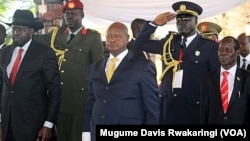Drums beat, traditional dancers performed, chorales sang, and women ululated as hundreds turned out at the John Garang Mausoleum in Juba to mark the fourth anniversary of South Sudan's independence.
But the celebrations had a somber overtone, with millions of people facing hunger, displacement and what the United Nations has called "unspeakable" levels of cruelty as a 19-month-old conflict in the world’s newest nation continues to rage in parts of the country.
In a speech at the massive birthday party, President Salva Kiir vowed to end the war and called on South Sudanese to seize Independence Day as "a new beginning of forgiveness and embracing one another in order to move our country forward.
"I urge you to join hands with me to stop this senseless war, and to work together for peace, reconciliation and reconstruction of our country,” Mr. Kiir said.
The president said he has worked tirelessly to end the fighting and the suffering of the people, and vowed to continue to do so.
"I do hear your cries for peace and stability. I know you want to support your families, move freely in the country and go back to business as usual," Mr. Kiir said.
"As you know, I have not rested and I think I will not rest until peace is achieved in South Sudan.”
Leaders 'haggle over power'
But the international community had a different view of things. In a video message to mark South Sudan's independence, U.S. National Security Advisor Susan Rice held Mr. Kiir and his arch-rival in the conflict, former vice president Riek Machar, "personally responsible for this new war and self-inflicted disaster."
"Only leaders on both sides can end this violence," Rice said. "Yet, President Kiir and Riek Machar would rather haggle over personal power and wealth than agree on solutions." Rice said that she is heart-broken "to see what South Sudan has become today.“
U.N. Secretary-General Ban Ki–moon recalled in a statement how he felt joy and hope as he watched South Sudan’s flag rise for the first time on July 9, 2011.
Today, Ban said, South Sudan "is a country where hope is in short supply."
U.S. Ambassador to the United Nations Samantha Power said while the people of South Sudan "want peace, want stability, just want to be able to send their kids to school, to work, to come home at night to their families... they have leaders who are more interested in their own personal fortunes than the welfare of their people.
"That has to stop," she said.
East African bloc IGAD, which has been trying for 18 months to get the warring sides to reach a deal to end the fighting in South Sudan, said it believes peace is not out of reach for the young nation.
But restoring peace depends on what Mr. Kiir and Machar do, IGAD said in a statement. IGAD called on the two men to show leadership and demonstrate to the world that they can restore peace and harmony in South Sudan, instead of sowing "division, mayhem and devastation."
In his speech, Mr. Kiir had his own message for IGAD. He said that while his government is committed to resolving the conflict under IGAD mediation, the end result must be "peace that is not imposed on us by others in order to divide us. The peace that we want is a just peace that must be owned by South Sudanese themselves.”
The IGAD-mediated peace talks broke off in early March without a deal. Since then, IGAD has proposed bringing more mediators into the talks, including the United States, the United Nations, China and the African Union.
At least 10,000 people have died in the 19-month conflict. The United Nations refugee agency said this week that three-quarters of a million South Sudanese have fled the country and another 1.5 million are internally displaced. The United Nations has also warned that 4.6 million South Sudanese face severe hunger because of the fighting, which has prevented farmers from cultivating their fields.
Karin Zeitvogel reported from Washington, D.C.





